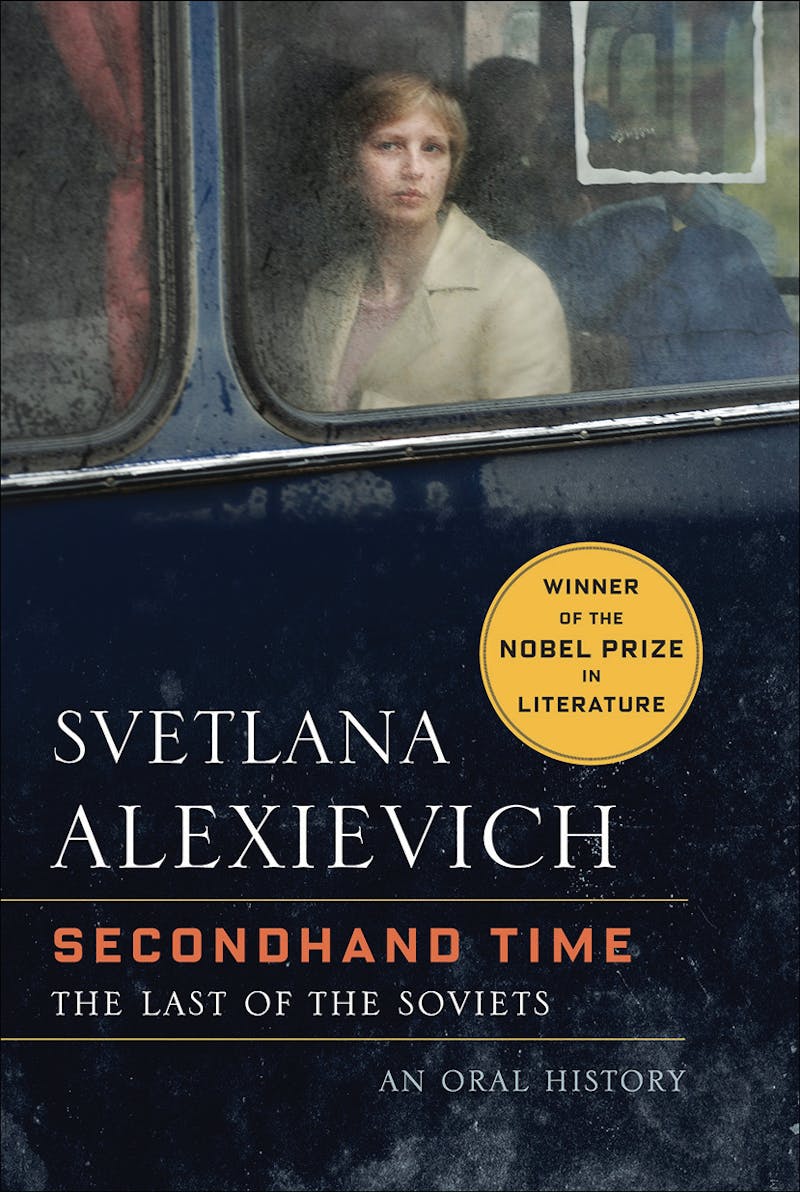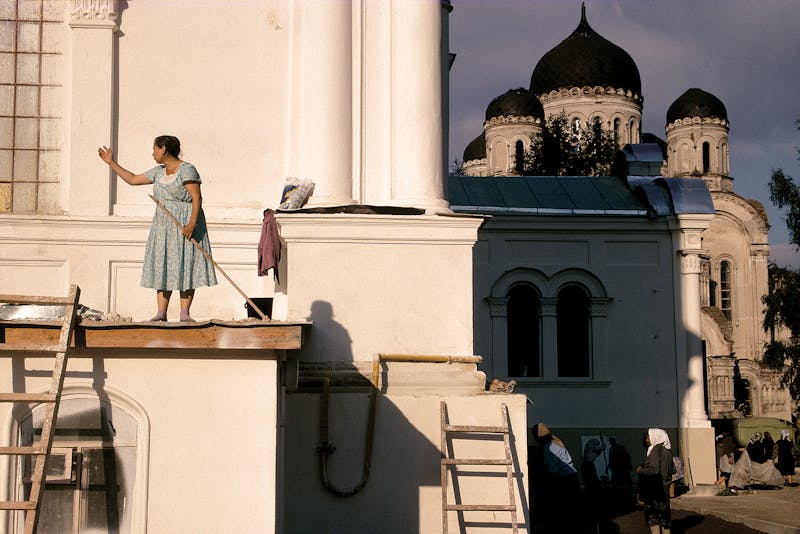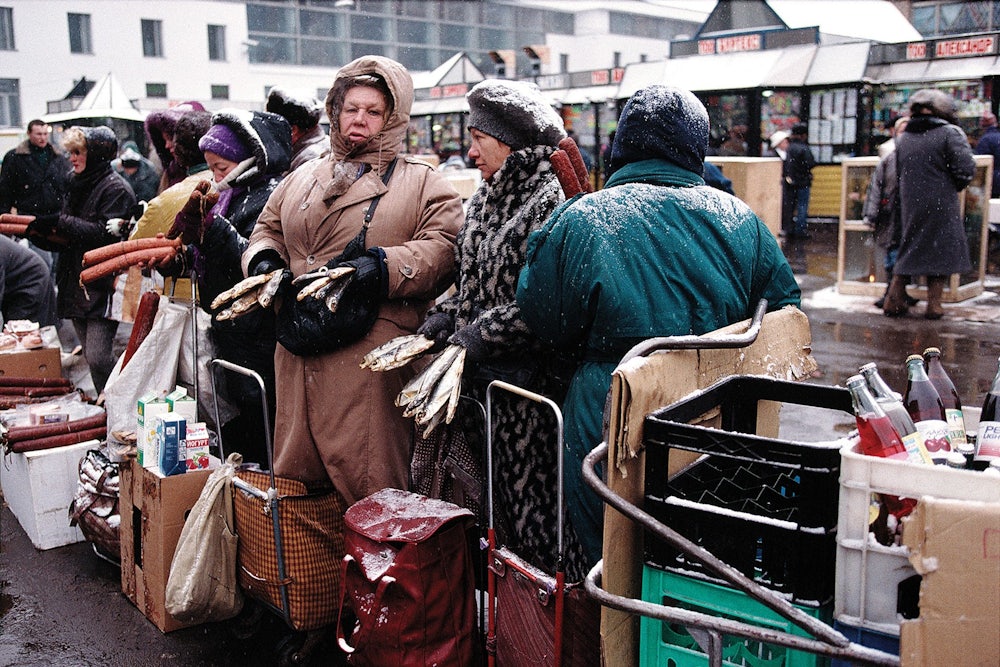Until she won the Nobel Prize in literature last year, Belarusian writer Svetlana Alexievich was largely unknown in the English- and Russian-speaking worlds. After beginning her career as a reporter, she has spent the past three decades working at the boundary of journalism and literature. Her books, which she calls “novels in voices,” are based on hundreds of interviews with ordinary citizens about some of the most painful episodes of the twentieth century: World War II, Chernobyl, the Soviet war in Afghanistan. She uses the voices of witnesses, interspersed with her own reflections, to express the collective trauma of world-historical events.

A pacifist opposed to Vladimir Putin, Alexievich was the perfect Nobel laureate for a new Cold War, as tensions between Russia and the West reached the highest levels in decades. Born in Ukraine in 1948 and raised in Belarus, Alexievich stood for post-Soviet people struggling nonviolently against Putin’s Russia, which many considered a new incarnation of the Soviet Union. In her Nobel lecture, Alexievich expressed a low opinion of the Soviet era’s utopian dreams:
I reconstruct the history … of how people wanted to build the Heavenly Kingdom on earth. Paradise! The City of the Sun! In the end, all that remained was a sea of blood, millions of ruined human lives.
In post-Nobel interviews, she criticized Putin and his involvement in the war in eastern Ukraine. Members of the Russian opposition were pleased; some mainstream Russian commentators denounced her Nobel selection as a political statement.
American journalists found their own reasons to celebrate her win. She was a woman writing about the effect of world events on ordinary people; she was an outspoken advocate for peace and respect for the environment. Since the Nobel Prize goes almost exclusively to novelists and poets, writers working in the sprawling, ill-defined world of “nonfiction” welcomed Alexievich’s win as an acknowledgment that even true stories can make great literature.
There was some confusion, however, about the lineaments of Alexievich’s chosen genre. The Western press described her as an “investigative journalist” and “contemporary historian,” accepting her work as accurate documentation of Soviet and post-Soviet reality. In interviews, however, Alexievich has stressed the literary nature of her intentions and methods, and she rejects the title of “reporter.” Her work opts for subjective recollection over hard evidence; she does not attempt to confirm any of her witnesses’ accounts, and she chooses her stories for their narrative power, not as representative samples. Her newly translated book Secondhand Time: The Last of the Soviets bears no resemblance to “investigative journalism.”
There is another, less obvious layer of ambiguity to Alexievich’s work and its reception. Though she has discussed her artistic approach in interviews, her books do not include a clear explanation of her methods. The casual reader can only guess at the extent to which she has pruned her interviews. It’s no surprise that most readers have accepted Secondhand Time as historically accurate. The American marketing encourages such an interpretation: The book is labeled as “oral history.” But as I discovered from examining earlier versions of the same stories that have not been translated into English, Alexievich treats her interviews not as fixed historical documents, but as raw material for her own artistic and political project. Her extensive editing—not only for clarity or focus, but to reshape meaning—brings Secondhand Time out of the realm of strictly factual writing. And by seeking to straddle both literature and history, Alexievich ultimately succeeds at neither.

Secondhand Time concludes a five-book cycle called “Voices of Utopia.” Only two other volumes are currently available in English. Zinky Boys, published in Russian in 1989, was praised, both inside and outside the Soviet Union, for calling attention to the horrific consequences of the Soviet war in Afghanistan, which was fought under the cover of heavy censorship; Voices From Chernobyl is probably Alexievich’s most admired work, a chronicle of the gruesome fallout of the nuclear disaster. In Secondhand Time, Alexievich turns to the fall of the Soviet Union—another genre of catastrophe.
Secondhand Time rehearses the familiar story of perestroika, glasnost, and the wild hopes and lost illusions of the post-Soviet 1990s. As the Soviet Union crumbled, members of the intelligentsia rejoiced in the idea that they would now be able to read and say whatever they pleased. But teachers, engineers, and doctors soon found themselves working as tradespeople, struggling to survive. Treasured libraries were sold off for grocery money, and the newly free market was flooded with trashy detective novels and porn. Russia’s nearly religious worship of great writers seemed to disappear overnight. As one of Alexievich’s eyewitnesses observes, “Words no longer meant anything.” All that mattered was money. Facing severe economic hardship, even starvation, many concluded that the Soviet Union had been a better deal.
Tales of suicide and thoughts of death form the core of Secondhand Time. A Soviet general hangs himself in his Kremlin office after the failed putsch against Gorbachev in 1991. A proud veteran of World War II commits suicide at the Brest fortress he once defended, leaving a note cursing Boris Yeltsin. One elderly man tells Alexievich that he denounced his uncle for hiding grain during the war. The uncle was promptly executed. “I want to die a communist,” the old man declares; if he is not a communist, he is complicit in murder and has suffered for nothing. Russia’s suicide rate peaked in the mid-’90s, at the staggering annual rate of 40 deaths per 100,000 people. As they saw their civilization disappear, Alexievich suggests, communist true believers lost their reason for living.
Noticeably absent from Secondhand Time is the cynicism of the late Soviet era. By the 1970s, many Soviet citizens talked the Soviet talk in public but traded Brezhnev jokes at home. While some political dissidents were full-blooded martyrs, others used samizdat to earn money or win Western support. Yet the simple story of dissident heroes, tragic victims, conformists, and villains remains popular in the Western press. This helps account for the almost reflexive rapture with which many critics greeted Secondhand Time. It also helps explain Alexievich’s Nobel. Read as a work of literature, however, the book feels repetitive and heavy-handed, reinforcing conventional wisdom about the Soviet and post-Soviet world while providing few new insights.
“I’m piecing together the history of ‘domestic,’ ‘interior’ socialism,” Alexievich writes at the beginning of Secondhand Time, “as it existed in a person’s soul.” She is interested not in what happened, or why, but in how people felt about it, and she draws on some of the techniques of traditional history and journalism without assuming the responsibilities of either. While her early work was more traditionally journalistic, over time she has stripped away context (most testimonies are prefaced with only a name, age, and profession) and relied increasingly on collages of unattributed quotations. Early in Secondhand Time, Alexievich writes:
History is concerned solely with the facts; emotions are outside of its realm of interest. In fact, it’s considered improper to admit feelings into history. But I look at the world as a writer and not a historian. I am fascinated by people.
In reality, some historians are very concerned with emotions. Recent years have seen a number of works focusing on subjective experiences of the Soviet period, such as Jochen Hellbeck’s Revolution on My Mind: Writing a Diary Under Stalin. And emotions aren’t off-limits to journalists, either. In A Small Corner of Hell: Dispatches From Chechnya, the late Anna Politkovskaya draws on “the logic of feelings” to describe the year of the Moscow theater massacre, when she helped Russian authorities negotiate with Chechen terrorists. Politkovskaya’s heroic work is an outstanding example of the use of first-hand testimony to illuminate a historical event, and it stays within the bounds of journalistic convention.
Alexievich doesn’t need to depart from history or journalism to write about feelings. Why, then, has she chosen the “novel in voices”? In an interview with Le Figaro, she explained, “I felt constrained by that profession [journalism]. The subjects I wanted to write about—the mystery of the human soul, evil—didn’t interest newspapers, and news reporting bored me.”
In Russian, Alexievich’s chosen genre is sometimes called “documentary literature”: an artistic rendering of real events, with a degree of poetic license. The idea is not new, in Russia or elsewhere. Another Nobel laureate, Aleksandr Solzhenitsyn, is an obvious point of comparison, as is Alexievich’s mentor, the Belarusian writer Ales Adamovich, who used historical documents as sources for his artistic depictions of World War II. But Alexievich goes unusually far in eliminating narrative trappings and relying almost exclusively on witness testimony that floats free of context.
Alexievich has the unusual habit of continuing to rewrite her books after they have been published, releasing them in new editions. She says this is because she sees them as living documents, and because she goes back to re-interview her subjects over the years. But sometimes she rewrites passages in ways that are primarily aesthetic—even at the cost of creating discrepancies—or that seem to reflect her evolving political values.
I was recently surprised to read an article by one of Alexievich’s French translators, Galia Ackerman, analyzing some of these revisions. Ackerman and her co-author, Frédérick Lemarchand, found phrases that had migrated from one person’s testimony to another’s, or from Alexievich’s reflections to those of an interview subject. An interview is used to support one message in one work and another in a second, either through editing or by removing context. Such changes point to the danger of understanding Alexievich’s “voices” as historical testimony, or interpreting them as evidence of a single, immutable truth.
Some of the stories in Secondhand Time first appeared in Enchanted by Death, which was published in 1993. (It has not been translated into English.) When I looked at the two versions side by side, I had the impression that I was comparing drafts of monologues from a play. Words, sentences, and passages were rearranged, removed, or added. The cumulative effect gave the revised version a sharper, more dramatic flavor, and an ideological message more in line with Western values. The choices were those of an author, not a reporter.
The story of Alexander Porfirievich Sharpilo, a pensioner who set himself on fire, is included in both Enchanted by Death and Secondhand Time, as told by his neighbor. For some reason, this neighbor’s name varies slightly: She is called Maria Tikhonovna Isaichik in Enchanted by Death and Marina Tikhonovna Isaichik in Secondhand Time. In the first version, she says:
In my village, when I was still young, there was an old man, he liked to watch children die.… He wasn’t crazy, he was okay, he had a wife and kids, and went to church. He lived for a long time.…
In Secondhand Time, she says:
Well … in our village, where I lived with my parents before I was married, there was an old man who liked to come and watch people die. The women would shame him and chase him away: “Shoo, devil!” but he’d just sit there. He ended up living a long time. Maybe he really was a devil!
The two versions convey different pictures of the old man. Despite the bizarre detail about liking to “watch children die,” the first version is less dramatic, less like a fairy tale and more like real life. The second version is more obviously “literary.” There are factual discrepancies, as well. In 1993’s Enchanted by Death, Isaichik says she is 80, which means she would have been born in 1912 at the very latest; in Secondhand Time she says she turned 16 when the Second World War ended, so she would have been born in 1929. The dead Sharpilo is 60 years old in Enchanted by Death and 63 in Secondhand Time, another reminder of Alexievich’s intentionally hazy chronology.
Some of the revisions serve a clear poetic purpose. In Enchanted by Death, for instance, Isaichik says that her neighbor was buried “without an orchestra, without music,” and that only his ex-wife wept. In Secondhand Time, she says that he was buried “with music, with tears. Everyone wept.” This small shift in detail alters our sense of the social context in which Sharpilo committed suicide. It emphasizes the solidarity of the Belarusian villagers, rather than Sharpilo’s loneliness and social isolation in the wake of divorce and retirement. Alexievich claims to be concerned with the truths of her subjects’ inner lives, but she revises their testimony until she has arrived at the kind of truth she set out to find.
The version of Sharpilo’s story presented in Secondhand Time eliminates Isaichik’s rather straightforward nostalgia for socialism and adds condemnations of Soviet and post-Soviet leaders alike. The revised version also puts significantly more emphasis on the horrors of war, Alexievich’s great theme, adding a passage lamenting the German massacre of the village’s Jews and offering a story about a neighbor who hid Jewish children. Isaichik says that her mother gave the children milk before they were caught by the Germans, whose dogs ripped them apart so savagely that “there was nothing but rags left of them.” The Germans tied the heroic neighbor to a motorcycle and made her run “until her heart burst.” It’s hard to imagine why Alexievich would have left such a tragic, cinematic episode out of the first version. In any case, the story of the Jewish children ties Isaichik’s story to one of history’s darkest episodes, making it easier for the reader (especially the foreign reader) to connect with Secondhand Time.
As such alterations make clear, Alexievich’s apparent reliance on other people’s voices doesn’t mean that she has removed herself from her books; she has only made herself less visible. She edits, reworks, and rearranges her interview texts, cleansing them of any strangeness that doesn’t serve her purposes. In doing so, she reduces the historical value of her work, effaces the texture of individual character, and eliminates the rhythm on which drama depends. It’s hard to get through Secondhand Time, not only because the subject matter is so painful, but because the testimonies are monotonous. As I read the book, I often wished that I could hear how Alexievich’s witnesses really sounded: their regional accents, their tone of voice, the pacing of their speech. I longed for the idiosyncrasies, false notes, and digressions of an actual interview.
There is little room, in Alexievich’s work, for anything that does not lend itself to meditations on the soul or the nature of good and evil. When she can’t link her material to world history, she turns to Greek tragedy. Introducing the story of a woman who left her husband and children to marry a man serving a life sentence for murder, Alexievich writes that some people involved felt that this was a tale that should be handled by a court, not a writer. (Perhaps they were unfamiliar with crime reporting, or Dostoevsky.) In response, Alexievich compares the woman to Medea, but Medea is a mythical character, a distillation and exaggeration of the most extreme human impulses. Alexievich bends her subjects into familiar literary, mythological, or historical types, with little regard for social context or specificity.
Poets, playwrights, and novelists are free to pick and choose from the material provided by the real world, and embellish and invent as they please. Their work is judged on its success in conveying a deeper, more abstract kind of truth—what in Russian is called istina, as opposed to pravda, the literal truth, the facts. Literary nonfiction writers, who search for deep truths while remaining faithful to facts, have obligations to both istina and pravda. They shape chaotic reality into compelling narrative, but they aren’t supposed to invent, or to edit so heavily that their subjects become unrecognizable. In exchange for this fidelity, nonfiction writers receive the trust of the reader, who accepts the improbable or poorly written simply because it is true.
Without the imprimatur of nonfiction, it is unlikely that Alexievich’s work would have won so much praise around the world. Rather than being taken as objective confirmation of the awfulness of the Soviet Union and Russia, the book might have been interpreted as an expression of the views of one particular writer. Readers would have been more skeptical about Alexievich’s shocking stories and less tolerant of her lack of nuance. Under scrutiny, Secondhand Time falls short as both fact and art.
